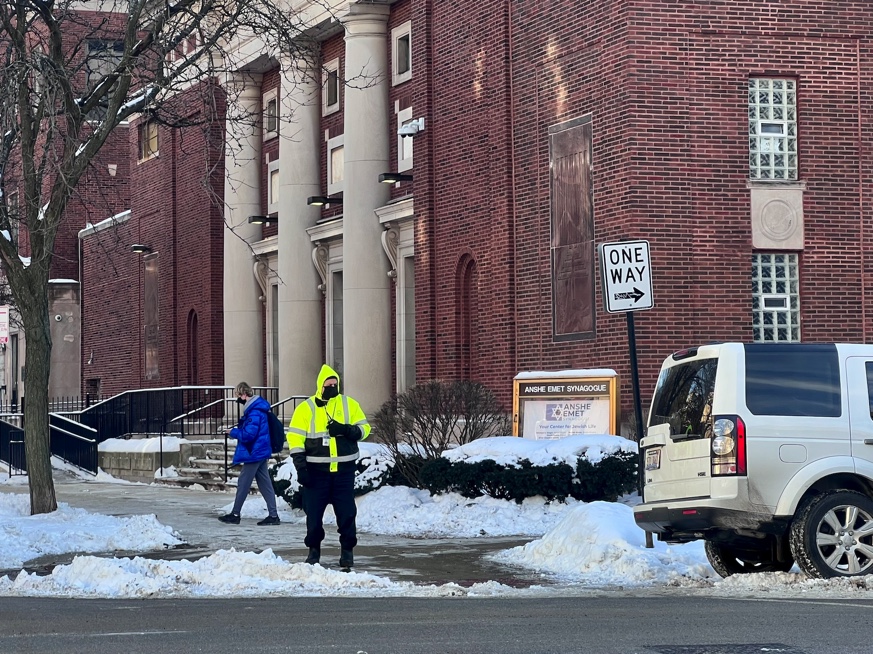Four people were taken hostage by British citizen Malik Faisal Akram at Congregation Beth Israel in Colleyville, Texas on January 15. While all hostages survived, the attack sent shockwaves through Jewish communities in Chicago and nationwide.
Just before the start of Shabbat morning services, Akram knocked on the door of the synagogue. The synagogue’s rabbi, Charlie Cytron-Walker, welcomed the man and offered him tea, believing he may have been in need. Mid-service, at around 11 a.m., Akram pulled out a gun on Rabbi Cytron-Walker. Akram demanded the release of Aafia Siddiqui, who was sentenced to 86 years at a nearby federal prison for the attempted murder of federal officials and troops.
Matthew DeSarno, the lead FBI agent, initially said that the attack was “not specifically related to the Jewish community,” but the agency later revised their statement. “This is a terrorism-related matter, in which the Jewish community was targeted,” the agency said.
Senior and co-head of JSC Naomi Altman said, “If you’re attacking a Jewish synagogue on Shabbat, holding a rabbi hostage, it’s inherently antisemitic.”
In response to student-raised concerns about the attack, Jane Charney, Assistant Vice President of Local Government Affairs for the Jewish United Fund, was brought in to Latin on January 24 to speak at an open Jewish Student Connection (JSC) affinity group meeting. Charney said, “DeSarno’s statement was confusing and scary and hurtful.” Especially considering the antisemitic tropes the attacker used, the situation and statement from the FBI did not line up, in Charney’s opinion.
Jeffrey Cohen, one of the four hostages, told Jewish Insider, “[Akram] was firmly convinced that he could come in here, hold a bunch of Jews hostage, and we—the greater we, the U.S.—would trade we Jews for this one prisoner, this one woman, because [Jews] have that much power and influence.”
When describing the shift in antisemitic hate between the 20th and 21st centuries, Charney shared that she grew up in the Soviet Union, where she experienced institutional antisemitism. “What we’re facing today, unfortunately, is much more insidious and much harder to define,” she said.
The year 2020 had the third-highest incidence of antisemitism since the Anti-Defamation League began recording data in 1979. Nearly three out of five religiously motivated hate crimes and 9 percent of all hate crimes were antisemitic in the U.S. that year, though Jews make up only roughly 2 percent of America’s population. These acts of hate came from across the political spectrum and ranged from vandalism to hate speech and physical violence.
In fact, just this past weekend, West Rogers Park was hit with a spate of antisemetic attacks. One man was verbally assaulted and four Jewish-owned businesses were vandalized, along with two synagogues—one of which had a swastika spray painted on its wall.
Freshman Danny Goodman, who identifies as Jewish, said that “antisemitic attacks can happen to anyone, anywhere. It’s a scary concept, but no matter how safe you feel, you aren’t truly safe.”
Matthew Tobias, Director of Security and Safety at Anshe Emet, a Chicago synagogue and school, said, “The number of antisemitic incidents continues to rise significantly year after year. Understandably, congregations are scared, and many congregants are living in fear.” He continued, “The hostage situation in Colleyville serves as yet another reminder for the need for my security team to be ever vigilant in our efforts to prevent an attack.”
Today, houses of worship face the dilemma of finding a balance between welcoming strangers and those in need, with protecting their congregants.
Charney has been lobbying on behalf of 55 groups in Illinois that range from religious groups to refugee services to receive $8 million from the state of Illinois to enhance security for organizations that did not receive federal grant money. “It’s not going to solve everyone’s problems,” she said. “Every community deserves to feel safe in their communal spaces.”
Freshman Elana Goldwin, who identifies as Jewish, echoed Charney. “No one should have to be scared to go outside and observe their religious beliefs,” she said.
Naomi said, “I thought that when anyone went to church or a religious [place], they had to go through metal detectors. I did not know that it was something only Jewish people had to do for much of my young life.” She continued, “I was always like, ‘Why do we have to do this?’ A hostage situation in Texas or Tree of Life. That’s why.”
To those concerned about being in-person at a synagogue right now, Senior Rabbi Michael Siegel at Anshe Emet Synagogue said that his synagogue is taking safety seriously and that attending services is a way to show that Jews will not be overcome by fear and hatred. “The building is safe, the community is welcoming, and we must not give those who hate us a victory,” he said.
Alexandra Fields, Director of College Counseling and faculty advisor to JSC said, “Unfortunately, this security is necessary. Sometimes security can feel almost antithetical to the Jewish faith, as we are taught to welcome the stranger.”
Rabbi Seigel said, “We have to go beyond words of unity and love to concrete actions that respond to hate, to racism whenever it raises its ugly head.”
Ms. Fields concluded, “How do we provide security and make people feel safe and comfortable in Jewish spaces without closing ourselves off to others and to the world?”
This story was originally published on The Forum on February 1, 2022.




































